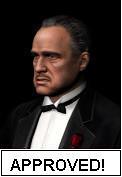Reading Material
Today's fun fact: Piers the Plowman, by William Langland, is a 14th century spiritual allegory, similar to Pilgrim's Progress - and is significant in being the first work of fiction to mention the character of Robin Hood.
The Ten books I think everybody should read, which you have probably never heard of. (Don't stop with just ten, though.)
The Lord of the Rings, by JRR Tolkein. So that you can see what imagination can do with words. Even without optical effects.
The Art of War, by Sun Tzu. Used as a guidebook for everything from business dealings to terrorist attacks, this book is best described as a strategy guide for everyday living. Especially if you are living in a war zone. Which, since 9/11, you are.
The Book of Style, by Strunk and White. If you cannot communicate, you are autistic, whether by congenital disease or by ignorance. This book contains the rules for communicating in the English language. Know them.
Journey to the West, by Wu Ch'eng-en. A serviceable translation is Monkey by Arthur Waley. This 16th Century story of the monk Tripitaka's travels to India and back, is one of the central pieces of Oriental fairy tales. Just as a Westerner knows Robin Hood and King Arthur, so Easterners know The Monkey King, Pigsy, and Sandy. To be fully conversant in world culture, you need this piece.
The Demon-Haunted World, by Carl Sagan. Even more important than Cosmos, this book is Sagan's warning about the importance, the need, for science in our lives and education. And what will happen to us if we don't retain it.
The Prince, by Machiavelli. Agree with him or not, this is the book that explains how governments think and handle things. And how people are handling you.
Hyperspace, by Michio Kaku. Fifteen chapters, 334 pages. The best explanation of modern physics in writing, explained so simply that even I understand it. This is the 1994 edition of Reality's user guide.
Asimov's Guide to the Bible, by Isaac Asimov. A very thick book by one of humanity's most prolific and knowledgeable authors, explaining all those phrases in the Bible you didn't understand, (Who was Pul, King of Assyria, anyway?) or only thought you understood. (Belial is not a demon. It's a word meaning worthless) Memorize this book, then reread your Bible, and have it come to life again.
The Davis Drug Guide, by F.A. Davis. Written for nurses and medical personnel, you'll probably need to read a couple of textbooks in order to make out most of what this book tells you. What this book tells you is the name of (just about) every medication on the market, both prescription and over-the-counter, along with how it works, side effects to look for, dosages, contraindications (why you shouldn't use it), and what you should be eating and doing (or not doing) while taking the drug. With the doctor shortage, we are all essentially healing ourselves. Here's the take-charge book.
Chariots of the Gods, by Erich von Daniken. Hard to believe that this book, written in 1968, is still making the rounds. Or that von Daniken is still writing more books (his latest is called Eyes of the Sphynx). Read this classic meander of half-truths, leapt conclusions, and curios, and remind yourself how easy it can be for someone to fool the unschooled, the credulous, and the uncritical.
Have fun.


0 Comments:
Post a Comment
<< Home